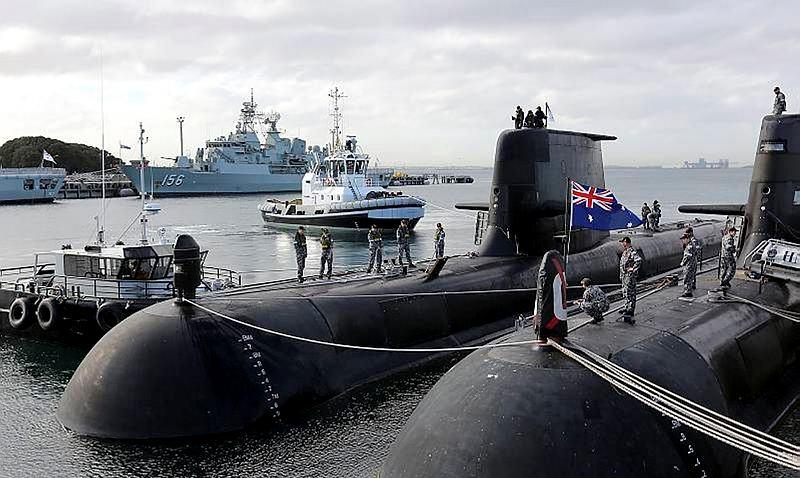Building submarines in Australia—is ASC the problem?
Posted By Graeme Dunk on March 13, 2015 @ 12:15
The Future Submarine (FSM) project has been the subject of significant commentary over recent months, leading to the statement [2] by Defence Minister Andrews on 20 February on the structure and conduct of the competitive evaluation that will be undertaken. That statement provided some additional clarity for industry but left many key questions unanswered.
Some of those questions should be addressed in the process that’s now underway, but the odds would have to be against the FSM being constructed in Australia. It remains to be seen whether there’s a hybrid build with some of the systems integration and final fit-out and testing being done in Australia—and importantly, who carries the not-insignificant risks [3] of such a strategy.
On 17 February, Air Chief Marshall Binskin was reported [4] as stating that it was ‘more important—in both economic and defence terms—that the life-long upkeep of the submarine fleet is done locally rather than actually building them at home’. He’s further reported as stating that ‘by integrating the systems such as sensors and combat systems into the boats at home, and testing the boats and their systems locally, Australia would get the know-how to do the sustainment work over the next 30 or 40 years’.
At face value both of those statements are correct, but neatly avoid the fact that Australia has built submarines at home, that the infrastructure for doing this is largely in place and that many of the right skills are available to build an off-shore design in country. Why throw that capability away? We’re unlikely to redevelop it at a later date.
If we ignore the sundry (important) unanswered questions regarding access to the design knowledge and intellectual property, considerations of associated strategic and sovereign risks, and the wider economic benefits that an in-country build would provide, we’re left to consider the risk the government perceives from committing to in-country construction. And that brings us to the potential builder: ASC.
The Government’s frustration with ASC has been evident since taking office; from repeated commentary around the schedule delays and cost overruns of the Air Warfare Destroyers to Senator Johnston’s remark [5] as Defence Minister that he wouldn’t ‘trust them to build a canoe’. Whether that comment was a ‘rhetorical flourish’, as subsequently claimed [6], or indicative of a deeper discomfort and distrust in the Government with respect to ASC is unclear, but more recent events tend to support the latter view.
On 19 February, at a hearing of the Senate Economics References Committee inquiring into the build of the submarines, senior ASC officials provided testimony that was frankly disappointing, disheartening, and even disturbing. That testimony indicated ASC hadn’t even bothered to determine from Defence the likely requirements for the FSM, nor undertaken any activities to promote its capability to build the FSM in Australia. Rather than proactively moving to develop its business, ASC seems to have chosen the ‘cargo cult’ approach to business—waiting for that business to come to them, and relying on the fact that they’re the only option for in-country construction. The fact that ASC chose such a course of action whilst under investigation by the government for its performance on AWD and Collins sustainment seems incredible. Then again, perhaps it isn’t—in spite of such an obvious lack of business development the ASC still receives DMO contracts worth the best part of a billion dollars per year.
The case for a local build has been vociferously argued by a host of commentators including politicians, defence industry, unions and academia—but not ASC. Such an approach detracts from the industrial position that many in Australia are trying to support and build, and devalues the position of multiple small companies in the ASC supply chain. How can an organisation that relies on naval work, and which would be the beneficiary of a decision to build submarines in Australia, not undertake the basic business development tasks to acquaint itself with the situation, understand the developing requirements, and promote its capability and capacity to undertake the job? Not to do so smacks of arrogance and complacency. Such an approach has no doubt confirmed and strengthened the government’s preconceived views regarding the risks in a local build—management risks, not necessarily technical risks.
It’s a pity there are no other options in country to undertake this work. It seems the attitude of government-owned shipyards has not changed since the dark days of the 1970s and early 1980s.
Graeme Dunk is manager of Australian Business Defence Industry, a national defence industry association. Image courtesy of Department of Defence [7].
Article printed from The Strategist: https://aspistrategist.ru
URL to article: /building-submarines-in-australia-is-asc-the-problem/
URLs in this post:
[1] Image: https://aspistrategist.ru/wp-content/uploads/2015/03/20130624ran8083167_066.jpg
[2] the statement: http://www.minister.defence.gov.au/2015/02/20/minister-for-defence-strategic-direction-of-the-future-submarine-program/
[3] not-insignificant risks: https://aspistrategist.ru/future-submarine-hybrid-or-australian-fitout/
[4] reported: http://www.smh.com.au/federal-politics/political-news/no-defence-need-to-build-submarines-in-australia-says-chief-mark-binskin-20150217-13h4on.html
[5] remark: http://parlinfo.aph.gov.au/parlInfo/search/display/display.w3p;db=CHAMBER;id=chamber%2Fhansards%2Fedf5b96a-d52d-4197-bf93-30e1e6514fbb%2F0034;query=Id%3A%22chamber%2Fhansards%2Fedf5b96a-d52d-4197-bf93-30e1e6514fbb%2F0000%22
[6] as subsequently claimed: http://parlinfo.aph.gov.au/parlInfo/search/display/display.w3p;query=Id%3A%22chamber%2Fhansards%2F846a92d1-8aa7-42c2-a0d9-561bcf7d14e2%2F0007%22
[7] Department of Defence: http://images.defence.gov.au/20130624ran8083167_066.jpg
Click here to print.
